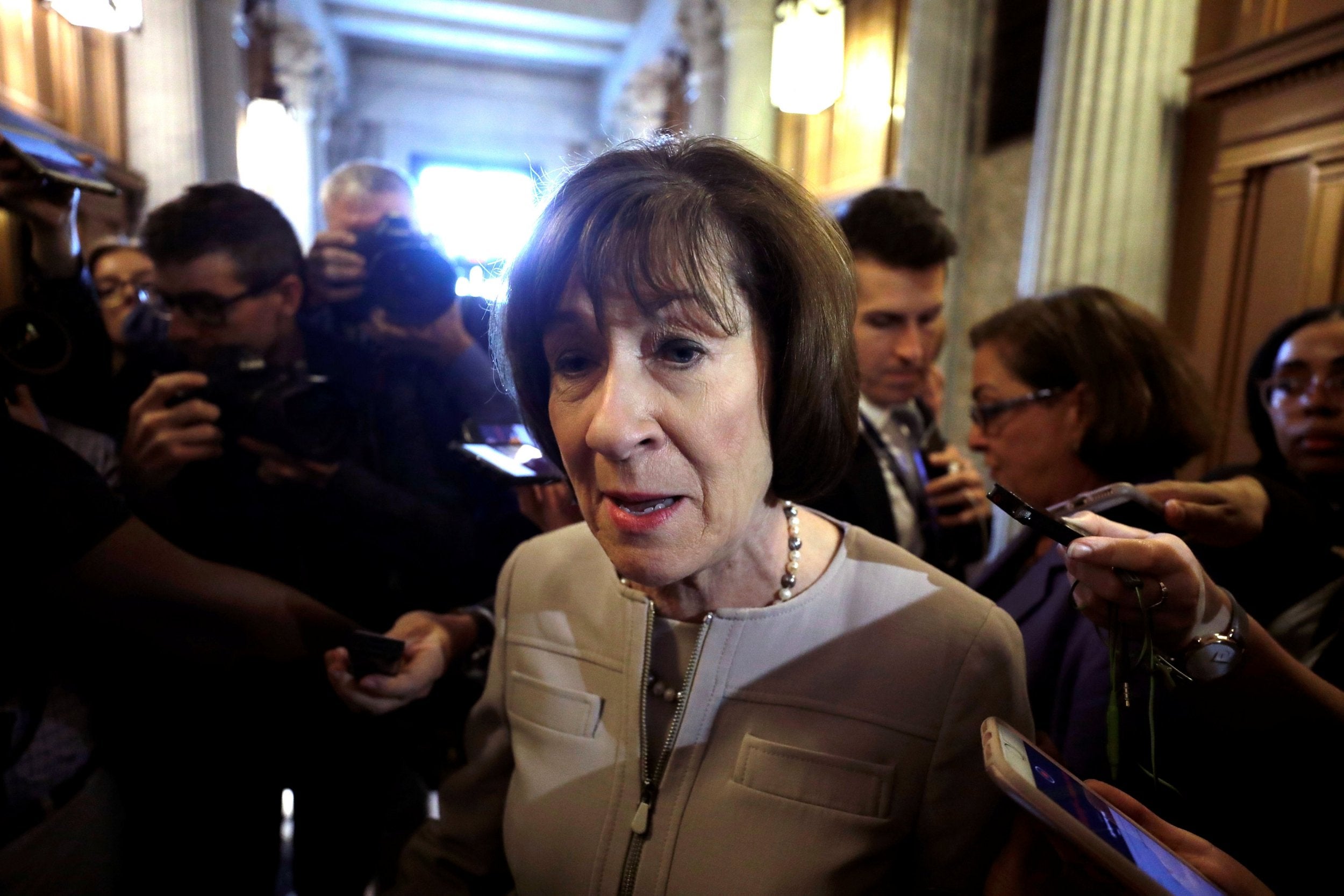Susan Collins condemned 'dark money' groups before Kavanaugh vote. One just bought a $100k advert for her
Judicial Crisis Network, which spent at least $5m on pro-Kavanugh advertising campaign, thanks senator for 'being a reasonable voice in Washington'

Your support helps us to tell the story
From reproductive rights to climate change to Big Tech, The Independent is on the ground when the story is developing. Whether it's investigating the financials of Elon Musk's pro-Trump PAC or producing our latest documentary, 'The A Word', which shines a light on the American women fighting for reproductive rights, we know how important it is to parse out the facts from the messaging.
At such a critical moment in US history, we need reporters on the ground. Your donation allows us to keep sending journalists to speak to both sides of the story.
The Independent is trusted by Americans across the entire political spectrum. And unlike many other quality news outlets, we choose not to lock Americans out of our reporting and analysis with paywalls. We believe quality journalism should be available to everyone, paid for by those who can afford it.
Your support makes all the difference.A conservative group that poured more than $5m (£3.8m) into a campaign to defend Brett Kavanaugh launched a new advert promoting and thanking Senator Susan Collins for her vote supporting the nominee.
“In the midst of the chaos one leader stood out,” one of the Judicial Crisis Network's adverts says. “She did the right thing, supporting him. Thanks, Susan Collins, for being a reasonable voice in Washington.”
The advert ends with a phone number for Ms Collins' Washington office.
The group did not disclose the amount it spent on the advert but said it would amount to more than $100,000 (£76,000) for television and digital ads.
Judicial Crisis Network is a 501(c)(4) advocacy organisation - a so-called “dark money” group because it is not required to disclose the sources of its funding regardless of the industry groups or individual donors behind them.
It poured at least $5.3m (£4m) into its pro-Kavanaugh advertising campaign, much of it targeting vulnerable Senate Democrats in red and swing states.
At least $1.5m (£1.1m) of that was spent defending Mr Kavanaugh after Christine Blasey Ford went public with her allegation of sexual assault against him.
A liberal group of a similar stripe, Demand Justice, spent at least $700,000 (£530,000) of a planned $5m (£3.8m) campaign trying to scupper Mr Kavanaugh's nomination.
Both groups represented the intense emotion and political energy generated by Mr Kavanaugh's nomination and confirmation fight, and both were subject to heated denunciations about how moneyed interests were clouding the debate.
Ms Collins, who was the focus of a sustained effort by activists concerned by the prospect of Mr Kavanaugh's confirmation on the court, was one of the loudest of these voices.
During a 44-minute speech from the Senate floor last week in which she announced her support for Mr Kavanaugh, effectively sealing his confirmation, she lambasted special-interest groups that spent an “unprecedented amount of dark money” to oppose him.
On Friday, she did not immediately respond to a request sent to a spokeswoman about whether she disavowed the use of “dark money” in the campaign to support her.
Collins' re-election chances in 2020 are already the subject of considerable intrigue.
Her reputation as a moderate has taken a hit because of her support of Mr Kavanaugh, a distinctly conservative judge who displayed a level of partisan fury during his hearings that raised questions about his fitness for the Supreme Court.
A group of liberal activists raised more than $3.5m ($2.7m) during the course of the nomination fight to be given to her eventual opponent.
And Susan Rice, President Barack Obama's former United Nations ambassador and national security adviser whose family is from Portland, Maine, hinted on Twitter that she could be interested in the seat.
This week, Ms Collins broke party ranks to vote with Democrats in a failed attempt to block a plan touted by the Trump administration for short-term health plans as an alternative to Obamacare.
Washington Post
Join our commenting forum
Join thought-provoking conversations, follow other Independent readers and see their replies
Comments